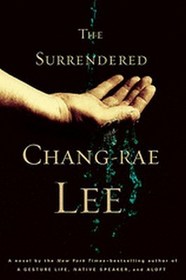Search -
The Surrendered
The Surrendered
Author:
Lee's masterful fourth novel (after Aloft) bursts with drama and human anguish as it documents the ravages and indelible effects of war. June Han is a starving 11-year-old refugee fleeing military combat during the Korean War when she is separated from her seven-year-old twin siblings. Eventually brought to an orphanage near Seoul by ... more »
Author:
Lee's masterful fourth novel (after Aloft) bursts with drama and human anguish as it documents the ravages and indelible effects of war. June Han is a starving 11-year-old refugee fleeing military combat during the Korean War when she is separated from her seven-year-old twin siblings. Eventually brought to an orphanage near Seoul by ... more »
The Market's bargain prices are even better for Paperbackswap club members!
Retail Price: Buy New (Hardcover): $18.39 (save 31%) or
Become a PBS member and pay $14.49+1 PBS book credit
![header=[] body=[Get a free book credit right now by joining the club and listing 5 books you have and are willing to share with other members!] Help icon](/images/question.gif?v=29befa08) (save 46%)
(save 46%)ISBN-13: 9781594489761
ISBN-10: 1594489769
Publication Date: 4/1/2008
Pages: 352
Rating: 11
ISBN-10: 1594489769
Publication Date: 4/1/2008
Pages: 352
Rating: 11
3.2 stars, based on 11 ratings
Publisher: Riverhead Hardcover
Book Type: Hardcover
Other Versions: Paperback, Audio CD
Members Wishing: 8
Reviews: Amazon | Write a Review
Book Type: Hardcover
Other Versions: Paperback, Audio CD
Members Wishing: 8
Reviews: Amazon | Write a Review
Genres:
- Literature & Fiction >> General >> Contemporary
- Literature & Fiction >> General >> Literary
- Literature & Fiction >> World Literature >> United States >> Asian American & Pacific Islander >> General
- Literature & Fiction >> World Literature >> United States >> Asian American & Pacific Islander >> Lee-Chang-Rae




